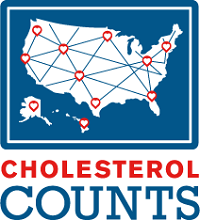 |
| Sanofi's and Regeneron's new cholesterol-testing campaign |
No question that the marketing people at Sanofi ($SNY) are excited about alirocumab, the next-generation cholesterol drug that's expected to make its debut next year. Analysts are talking about multibillion-dollar sales, and recent trial data--not just from Sanofi and its partner Regeneron ($REGN)--may build optimism even further.
So it's no wonder that Sanofi and Regeneron are already gearing up to promote the PCSK9 inhibitor, now dubbed Praluent. The companies have partnered with patient groups and professional organizations on a new cholesterol-testing campaign.
For a kick-off, the "Cholesterol Counts" effort is taking a patient poll, with plans to roll out the results sometime in 2015--close to an anticipated launch date, we'd guess. The campaign website's red-white-and-blue color scheme and strategically placed U.S. map make cholesterol-fighting seem like a patriotic duty.
The online poll--at CholesterolCounts.com--collects demographic information, including age, location, education level, and income. It also assesses participants' knowledge about their own cholesterol levels, the consequences of high cholesterol, and treatment options. For those who've been diagnosed with high cholesterol, the poll asks about current treatment strategies.
With a cadre of new cholesterol drugs on their way, expect to hear a lot more about "bad" LDL, "good" HDL and triglycerides. The PCSK9 class includes products from Amgen ($AMGN) and Pfizer ($PFE) as well as the Sanofi/Regeneron drug, and all the companies will be working to make a new market. The specialty cholesterol drugs--injectable antibody treatments--will be pricey, and drugmakers face a job persuading doctors and payers that they're worth adding to statin therapy.
The PCSK9 contenders are racking up study data to build their individual cases, with a heavy emphasis on patient outcomes. Sanofi and Regeneron recently rolled out a post-hoc analysis showing that alirocumab cut the number of heart attacks and strokes by half in patients with homozygous familial hypercholesterolemia and high-risk cardiovascular patients. The study wasn't designed as an outcomes trial, but the results were encouraging. The two companies have an actual outcomes study ongoing, as does Amgen; Pfizer plans outcomes trials for its PCSK9 drug bococizumab.
Plus, Sanofi and Regeneron--and to an extent, the entire PCSK9 class--got a boost from an entirely different source: Merck's ($MRK) outcomes trial testing its combo drug Vytorin, which marries the statin Zocor with a novel cholesterol-fighter, Zetia. The study showed that adding Zetia to Zocor therapy cut cardiovascular complications. It was a modest improvement, but significant. That outcomes data helped strengthen the case for pushing cholesterol numbers downward, even if that means adding another drug to already powerful statin therapy.
Then, last month, Sanofi and Regeneron followed that news with stats showing that alirocumab beat Zetia in a head-to-head trial. In patients who can't tolerate statins, the alirocumab arm reported a 45% decrease in LDL, compared with a 14.6% cut in Zetia patients. The Sanofi/Regeneron drug got 42% of patients to their cholesterol goals, compared with 4% of Zetia patients. Alirocumab is "a more potent and more effective lipid-lowering drug, getting patients to goal by a 10-fold higher amount. It just blows [Zetia] away," lead author Patrick Moriarty said at the time.
Alirocumab and its ilk won't be first-line treatments for most patients. So why an awareness push? Sanofi and Regeneron's campaign might inspire statin patients--or even better, their doctors--to get more serious about hitting cholesterol numbers. That, in turn, could steer hard-to-treat people toward a more potent add-on like the Sanofi antibody. Given Sanofi's dearth of experience in the cholesterol arena, anything that puts the words "Sanofi" and "Regeneron" on the same page with "LDL" and "HDL" could be a good thing.
Sanofi and Regeneron haven't yet asked the FDA to approve alirocumab, putting it one step behind Amgen, which filed for evolocumab approval in August. But Sanofi and Regeneron bought a priority review voucher earlier this year, which would speed up FDA review by several months, possibly putting alirocumab on the market first.
- read Sanofi and Regeneron's press release
- take the poll at Cholesterol Counts
Special Reports: 10 top drugs in biopharma's late-stage pipeline - Alirocumab | The 10 best-selling drugs of 2013